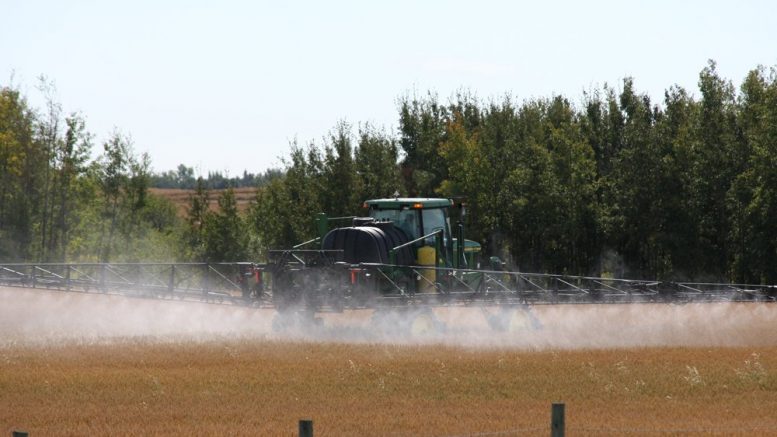A Moose Jaw farmer is leading a class action lawsuit against Bayer and Monsanto.
Garry Gadd, who is in his 50s, was diagnosed with cancer five years ago. The lawsuit contends that exposure to Roundup herbicide contributed to his cancer and the cancer of other Canadians participating in the class action.
As well, the suit claims Monsanto, which Bayer acquired in 2018, withheld information about the safety of its herbicide.
Merchant Law Group, a firm best known for the $1.9 billion residential school settlement, has already filed a motion for the class action.
“We have sued in Saskatchewan. We’ve applied to have a judge and we’re ready to go forward with certification (for the class action),” said Tony Merchant, founder of Merchant Law Group, which has six offices in Saskatchewan and 19 across Canada.
Gadd was diagnosed with non-Hodgkin’s lymphoma in 2014.
He contacted Merchant Law Group last fall. So far, he is not speaking publicly about the case.
“He’s a relatively young man,” Merchant explained, saying Gadd is an ideal lead plaintiff for the class action because the Moose Jaw farmer used pesticides carefully.
“From the early 1990s he (did) custom spraying. And he took safety courses in pesticide use…. In 1997 he began spraying Roundup on pre-seeding to control weeds. He used Roundup a minimum of two times per year.”
So far, less than a dozen people are part of the class action, the CBC reported. Most of them are from the Prairies.
“We have people in Western Canada, particularly, because Roundup is used (there) so commonly. People who have cancer,” Merchant said.
The number of participants may soon expand.
Following The Western Producer’s May 15 story posted online on the lawsuit, five people contacted the paper saying they have cancer and want to join the class action.
Bayer Canada said it is aware of the statement of claim in Saskatchewan and the proposed class certification related to glyphosate — the active ingredient in Roundup.
“Due to privacy laws and the litigation process in Canada, we are limited to the information we can provide on these matters,” Bayer said.
“While we have great sympathy for the plaintiffs, glyphosate-based herbicides are not the cause of their illnesses and we will rigorously defend our products. Glyphosate has been extensively studied globally by scientists and regulators, and results from this research confirm it is not carcinogenic. We firmly stand behind the safety of glyphosate-based products and as a company devoted to life sciences, assure Canadians that their health and the environment are our top priority.”
Over the last nine months, there have been three major court decisions in California regarding the safety of Roundup. On May 13, a California jury awarded US$2 billion to a couple who claimed that Roundup caused their cancer.
In March, a San Francisco jury awarded $80 million to another California man who said Roundup caused his cancer. As well, last August a jury ordered Monsanto to pay $289 million to a California groundskeeper who developed non-Hodgkin’s lymphoma. It was later reduced to $78 million.
The potential class action in Saskatchewan and the U.S. lawsuits stem from a 2015 World Health Organization (WHO) decision.
In March of that year, the International Agency for Research on Cancer, a division of WHO, classified glyphosate as “probably carcinogenic to humans.”
Dozens of toxicologists and a number of national regulatory bodies, including Health Canada and the European Food Safety Authority, criticized the IARC decision as biased and flawed. In January Health Canada issued the results of a scientific study on glyphosate, reviewing its 2017 evaluation of the herbicide’s safety.
Health Canada said its 2017 decision “will stand” — glyphosate is not a risk to human health.
“Our scientists left no stone unturned in conducting this review. They had access to all relevant data and information from federal and provincial governments, international regulatory agencies, published scientific reports and multiple pesticide manufacturers,” Health Canada said in January.
“No pesticide regulatory authority in the world currently considers glyphosate to be a cancer risk to humans at the levels at which humans are currently exposed.”
Health Canada may believe glyphosate is safe, but its stance will not be the final word on this topic.
Lawyers could be litigating its safety, in a Moose Jaw or Regina court, by next January.
“Early 2020,” Merchant said. “It could be November-December of 2019.”
Source: www.producer.com





Be the first to comment on "Sask. Farmer Leads Roundup Class Action"